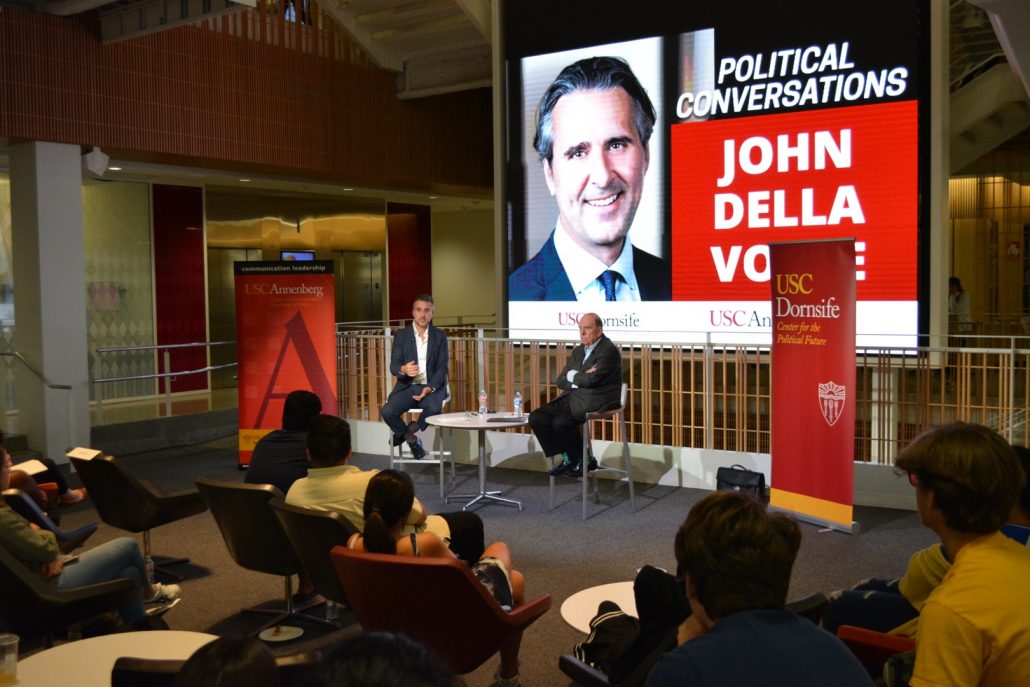Pollster discusses millennial, Gen Z voter trends ahead of 2020 elections

(Brigitte Canty | Daily Trojan)
Nearly 60 people attended an event in Wallis Annenberg Hall with John Della Volpe, director of polling at the Harvard Kennedy School Institute of Politics, Thursday. Center for the Political Future Director Bob Shrum hosted Della Volpe for a discussion on millennial voters, the 2020 election and the evolution of demographics in the United States.
The event was co-hosted by CPF and the Annenberg Center on Communication Leadership and Policy and is part of the center’s Political Conversations series.
Della Volpe started the discussion by discussing the impact of millennial and Generation-Z voters on national elections.
“[Millennials] have a different set of values than the generations that preceded them,” Della Volpe said. “The set of values makes them a different kind of voter. When I started this project back in 2000, there was essentially no real difference between the way a 28-year-old voted and a 68-year-old voted. The generation gap back then, if you look at those exit polls, was two points. Today, the midterm elections in 2018 had a 36-point gender gap, 36-point generation gap.”
Della Volpe said that millennials create ideological shifts in voting patterns and that voter turnout rates relative to previous generations have increased.
“They’re showing up to vote,” Della Volpe said. “The average level of participation in the last 30 years for midterm elections was about 16%. Not very high. Only about one in seven young people under the the age of 30 voted on average in the last 32 years, the last 16 midterm elections. The last midterm election back in November, conservatively, 33% voted. So not only is this generation of a different set of values, more progressive, but they’re voting at rates in which we’ve never seen, at least in a couple of decades, and that make them a unique and important political force.”
Beyond voter turnout, Della Volpe discussed the country’s Republican-Democrat divide and the demographics that both parties attract for political gain.
“It’s a fallacy that young people are born democrats,” Della Volpe said. “Back when I started this, young voters were basically 50/50, they weren’t always Democrats. So there’s been a lot of things that have changed from the lens of the Republican party that have been make or break.”
Della Volpe discussed the phenomenon of the “Trump effect” and how Donald Trump has impacted white older voters and pandered to their disillusionment with politics.
“I think they’re good people,” Della Volpe said. “They’ve worked as hard as they possibly could. Hiscomplaint is that it’s the system. They look at everyone as part of the system and they discount some of the tweeting and say, ‘At least he’s breaking up the system that I think needs to be broken up.’”
Della Volpe said he believes that older voters’ discontent with political systems has led to increased racial tensions. But Della Volpe was quick to point out that it was not just the 2016 election that increased division in the country, but that this division stems from a change in American political culture.
“Five, six years ago I would spend a lot of time coordinating focus groups and town meetings and I’ve asked, ‘What is it that connects us as Americans?’ And I’d from anywhere from Mephmis to Philadelphia to Beverly Hills and they’d…say opportunity,”Della Volpe said. “Today, I ask the same question, and almost every single time, I hear fear. Fear is what connects us. And I ask, ‘What? Fear of what?’ Fear of death, fear of drugs, fear of the future…and that’s the thing that connects people.”
Quillan Sortino, a sophomore majoring in journalism, said he enjoyed Della Volpe’s analysis of the Republican party’s political strategy and learned about certain voter demographics.
“It was interesting to hear about how Republicans and Democrats struggle with certain types of groups in voting and how losing that group could be disadvantageous for them and this whole idea of how Republicans use immigrants as an attacking point to bring across their agenda, when in reality there are a lot of people who are Republican that also view immigration as a net plus,” Sortino said.
Shwetha Ganesh, a sophomore majoring in international relations and the global economy, said she learned more about electoral politics and appreciated Della Volpe’s analysis of voting demographics.
“I thought that the attendees were already politically minded, and the speaker wasn’t transformative in his insights,” Ganesh said. “Despite that, it was very interesting to see all of the data because that’s not something I’m really involved in.”

